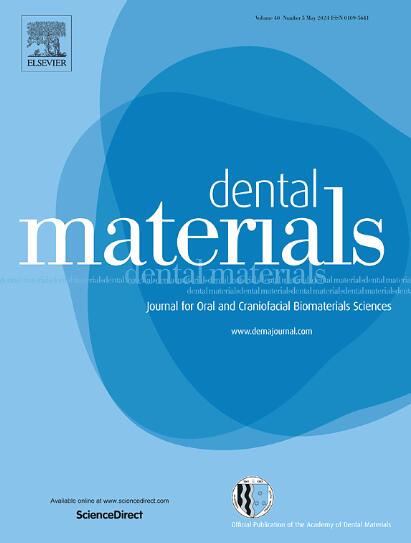用于有效清除牙周组织中牙科生物膜的抗菌粘合剂自愈合水凝胶。
IF 4.6
1区 医学
Q1 DENTISTRY, ORAL SURGERY & MEDICINE
引用次数: 0
摘要
目的:包括牙龈卟啉单胞菌等病原体在内的口腔生物膜参与了各种牙周疾病的发生和发展。然而,由于许多抗菌材料在口腔的恶劣条件下清除生物膜的功效有限,因此阻碍了这些疾病的治疗。我们的目标是开发一种具有最佳理化特性、强组织粘附性、持久抗菌活性和生物兼容性的凝胶型抗菌剂,作为牙周疾病的辅助治疗药物:方法:使用碳二亚胺偶联剂合成了苯硼酸共轭海藻酸盐(Alg-PBA)。然后将 Alg-PBA 与单宁酸 (TA) 结合,制成 Alg-PBA/TA 水凝胶。对水凝胶的成分进行了优化,以增强其机械强度和组织粘附性。此外,还对水凝胶的自愈合能力、侵蚀和释放特征、生物相容性以及对牙龈脓毒性的抗菌活性进行了深入研究:结果:Alg-PBA/TA 水凝胶(TA 的最终浓度为 5 wt%)的机械性能与传统的米诺环素凝胶相当,并且具有很强的组织粘附性。相比之下,米诺环素凝胶的组织粘附性几乎可以忽略不计。由于 Alg-PBA/TA 水凝胶具有自愈能力,因此在重复 5 kPa 应力作用下仍能保持其流变特性,而米诺环素凝胶仅在一个应力周期后就出现了不可逆的流变变化。此外,Alg-PBA/TA 水凝胶显示出持续的侵蚀和 TA 释放特性,对周围 pH 值的影响极小。此外,水凝胶还对牙龈脓胞具有很强的抗菌活性,能有效消除其生物膜,同时不影响 MG-63 细胞的活力:Alg-PBA/TA水凝胶是机械强度、自愈合能力、组织粘附性、良好的生物相容性以及对牙龈脓胞的持续抗菌活性的最佳组合。这些特性使其优于传统的米诺环素凝胶。因此,Alg-PBA/TA 水凝胶是一种很有前途的候选抗菌剂,可用于各种牙周疾病的辅助治疗。本文章由计算机程序翻译,如有差异,请以英文原文为准。
Antimicrobial adhesive self-healing hydrogels for efficient dental biofilm removal from periodontal tissue
Objectives
Oral biofilms, including pathogens such as Porphyromonas gingivalis, are involved in the initiation and progression of various periodontal diseases. However, the treatment of these diseases is hindered by the limited efficacy of many antimicrobial materials in removing biofilms under the harsh conditions of the oral cavity. Our objective is to develop a gel-type antimicrobial agent with optimal physicochemical properties, strong tissue adhesion, prolonged antimicrobial activity, and biocompatibility to serve as an adjunctive treatment for periodontal diseases.
Methods
Phenylboronic acid-conjugated alginate (Alg–PBA) was synthesized using a carbodiimide coupling agent. Alg–PBA was then combined with tannic acid (TA) to create an Alg–PBA/TA hydrogel. The composition of the hydrogel was optimized to enhance its mechanical strength and tissue adhesiveness. Additionally, the hydrogel’s self-healing ability, erosion and release profile, biocompatibility, and antimicrobial activity against P. gingivalis were thoroughly characterized.
Results
The Alg–PBA/TA hydrogels, with a final concentration of 5 wt% TA, exhibited both mechanical properties comparable to conventional Minocycline gel and strong tissue adhesiveness. In contrast, the Minocycline gel demonstrated negligible tissue adhesion. The Alg–PBA/TA hydrogel also retained its rheological properties under repeated 5 kPa stress owing to its self-healing capability, whereas the Minocycline gel showed irreversible changes in rheology after just one stress cycle. Additionally, Alg–PBA/TA hydrogels displayed a sustained erosion and TA release profile with minimal impact on the surrounding pH. Additionally, the hydrogels exhibited potent antimicrobial activity against P. gingivalis, effectively eliminating its biofilm without compromising the viability of MG-63 cells.
Significance
The Alg–PBA/TA hydrogel demonstrates an optimal combination of mechanical strength, self-healing ability, tissue adhesiveness, excellent biocompatibility, and sustained antimicrobial activity against P. gingivalis. These attributes make it superior to conventional Minocycline gel. Thus, the Alg–PBA/TA hydrogel is a promising antiseptic candidate for adjunctive treatment of various periodontal diseases.
求助全文
通过发布文献求助,成功后即可免费获取论文全文。
去求助
来源期刊

Dental Materials
工程技术-材料科学:生物材料
CiteScore
9.80
自引率
10.00%
发文量
290
审稿时长
67 days
期刊介绍:
Dental Materials publishes original research, review articles, and short communications.
Academy of Dental Materials members click here to register for free access to Dental Materials online.
The principal aim of Dental Materials is to promote rapid communication of scientific information between academia, industry, and the dental practitioner. Original Manuscripts on clinical and laboratory research of basic and applied character which focus on the properties or performance of dental materials or the reaction of host tissues to materials are given priority publication. Other acceptable topics include application technology in clinical dentistry and dental laboratory technology.
Comprehensive reviews and editorial commentaries on pertinent subjects will be considered.
 求助内容:
求助内容: 应助结果提醒方式:
应助结果提醒方式:


